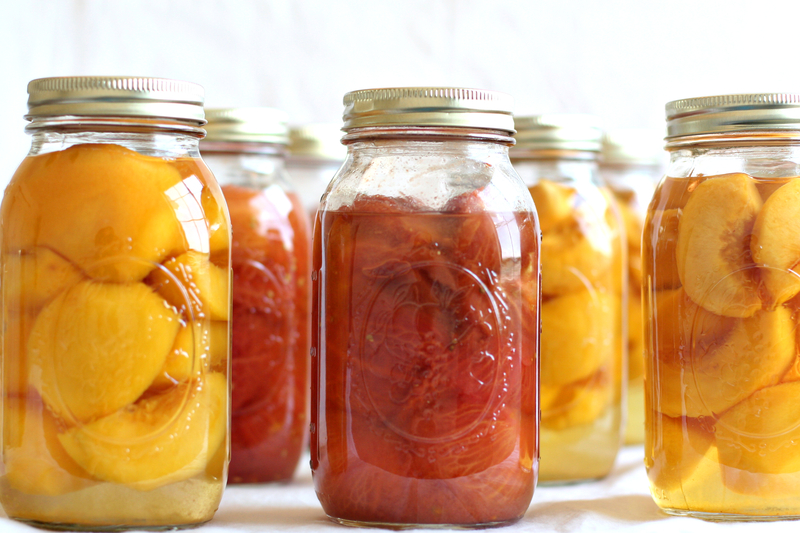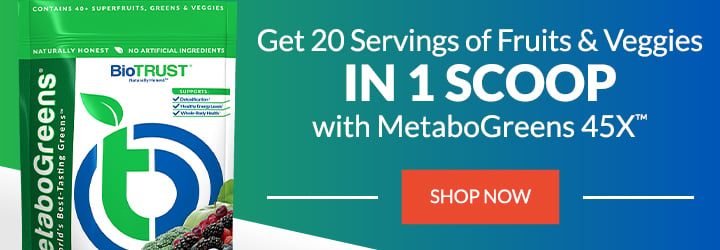Is Canned Fruit Healthy? See the Pros + Cons

As fall and winter approach, in many parts of the country, we’re looking at the fresh fruits available at farmers’ markets and in the produce section, knowing that time is short. Unfortunately, these tasty treats will soon be out of season, which means the costs will go up as the flavor dips, if we can even find them. Instead, we may be looking toward the frozen and canned sections of the store. Yet, isn’t canned “packaged” and therefore less nutritious? Is canned fruit healthy or something to forego—as we wait for spring?
Before stocking up on canned mandarin oranges, peaches, pears, berries, or cherries, let’s find out how healthy canned fruit can be.
What is Canned Food?
Refrigeration has been part of our lives for as long as we can remember. But there are times and places when it’s simply not available. Thus, we need another way to preserve food. Canning was originally developed in the 18th century to ensure soldiers and sailors had a stable food source of fruits and vegetables, beans, soups, and even meat and seafood.
To can foods, the food is first processed, which can involve slicing, peeling, pitting, shelling, seasoning, and cooking, depending on the food and the recipe. The food is then sealed securely in the cans (or jars). The containers are then heated to kill bacteria and completely seal the can or jar, which then prevents it from spoiling for at least a year and up to five years or more.
The type of fruit can affect how long a food can be stored. For example, canned acidic fruits like oranges and pineapple typically have a shelf-life of around 18 months. Low-acid fruits like apples or papayas typically stay fresher for longer—between two and five years. That said, how cans are stored also makes a difference. If possible, store in a cool, dark room out of direct sunlight, such as a pantry, to avoid extremes in temperature, which can cause the food to spoil faster.
Is Canned Fruit Healthy?
Fruits, in general, are rich in antioxidants, vitamins and minerals, as well as fibers. And according to dieticians, adults should include at least two servings of fruit in their daily diets, no matter what the season.
While many people prefer the taste or texture of fresh fruits, others lean more toward the soft, juicy sweet goodness of canned versions. Others fear that canned produce just isn’t as nutritious. Yet when it comes to nutrition, whether fruits are canned, frozen, or fresh, they’re all quite similar—as long as they don’t have added sugars. Protein, carbs, and fats are not affected by the canning process, and most vitamins and minerals are retained well.
Pros of Canned Fruits
One of the biggest benefits of canned fruits is the cost. Canned fruits tend to be less expensive than fresh (sometimes half as much). Plus, they’re less likely to go bad. Fresh fruits—especially berries—can have surprisingly short shelf lives. And if you don’t eat them within a few days, they can turn mushy or moldy. Yuck!
Canned fruits can be kept for months or years and tend to be very friendly on the budget. And while some fruits may be better when fresh, many are pretty darn tasty when canned. (Some would even say they’re better.)
Some canned fruits can even provide a little more nutrition than fresh. Vitamin C tends to diminish quickly with fresh fruits as it’s degraded by air exposure. Canned fruits, on the other hand, may retain higher levels of C, even after being stored for months, as they’re preserved at their peak.
Canned pineapple, for another example, has just a tad more calcium, magnesium, and potassium than fresh. And it provides equal amounts of iron and zinc. Canned pineapple also tends to be much easier to prepare—as long as it has a pull tab or you have a decent can opener.
Cons of Canned Fruits
The biggest issue with canned fruits is they often have added sugar, such as a heavy or light syrup. Others are canned within their own juices. Some fruits, such as pears and peaches, are often canned only after the fiber- and nutrient-rich peels have been removed. Thus, they may be naturally lower in fiber and higher in sugar than their fresh counterparts. And the juice from the fruits can also increase the calorie count.
Heavy syrup is typically made from a combination of water, corn syrup, and sugar, and the calories per serving are significantly higher than a serving of fresh fruit. For instance, peaches canned in heavy syrup can add over 200 calories, 25 grams of carbs, and 21 grams of sugar to a serving. Sounds more like a dessert than a healthy snack!
Light syrups are typically made from sugar water and can add up to 85 calories and 13 grams of sugar. Even fruits canned in their own juices can increase the calorie content. For example, canned peaches with a half-cup serving of juice can increase the calories by 60 and add extra sugars.
Watch out, especially, for fruit cocktails, which are often packed in syrup (heavy or light) with added flavors and even artificial colors.
The healthiest canned fruits are packed with their peels intact in just water. The water keeps them juicy and fresh tasting and drops the sugar to around six grams per serving, depending on the fruit.
While home-canned goods can be a great way to save your summer bounty for the colder months, please ensure you’re canning and sealing them correctly. If improperly canned, there’s an increased risk of serious food-borne illness, including botulism.
Though it’s exceedingly rare, damaged cans can also increase this risk, so avoid any that look bloated or cracked or are leaking or dented. And if you open a can and the fruit looks questionable—for example, if it’s foaming or has a weird odor, just toss it as it’s not worth the risk.
Another drawback of some canned foods is the presence of chemicals like BPA (bisphenol-A), which was used in up to 90% of cans a decade ago. While there is some debate, some studies have linked these chemicals to heart disease, diabetes, and reproductive issues. The vast majority of manufacturers (at least 90%) no longer use the controversial chemical. Food cans still are lined with acrylic or polyester materials to prevent cans from rusting, which can protect against bacteria and help extend shelf-life.
Is Canned Fruit Healthy? A Wrap Up
Whether you’re choosing canned foods for convenience, cost, availability, or preference, as long as you choose fruits without added sugars, you’re still making a healthy choice. In fact, you may be making an even healthier choice if your fresh produce is being shipped halfway around the world before it reaches your plate.
Canned fruits provide loads of nutrients, including vitamins, minerals, and antioxidants. They also allow you to enjoy a wider variety of foods throughout the year. Finally, these foods are low in calories, fat, and sugar while providing a tasty, sweet treat in recipes or even when just spooned into a bowl.




 US Doctor: "Eating This Every Day Can Snap You Into Ketosis"
US Doctor: "Eating This Every Day Can Snap You Into Ketosis" 3 Key Nutrients to Help Lubricate Your "Tin Man" Joints
3 Key Nutrients to Help Lubricate Your "Tin Man" Joints AVOID Plant-Based Protein Powders (unless...)
AVOID Plant-Based Protein Powders (unless...)

